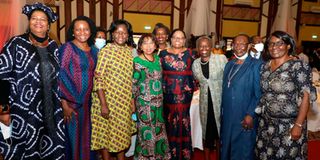The making of Kenya’s first female Chief Justice

Chief Justice and President of Supreme Court Martha Koome (C) with some female judges and Judiciary staff during her thanksgiving luncheon hosted by the Ministry of Public Service and Gender in her honour, at a Nairobi hotel last Friday.
What you need to know:
- During a luncheon held last Friday at a Nairobi hotel the CJ's honour, distinguished women lifted the card for take-aways, besides commending her for breaking the glass ceiling.
- Supreme Court Justice Njoki Ndung’u said CJ Koome’s achievement is a historic triumph in the women’s struggle to have their own lead in the Judiciary and Legislature.
As women pride in the achievement of Martha Koome as Kenya's first female Chief Justice (CJ), her rise to the helm of Judiciary draws some lessons for fellow women.
During a luncheon held last Friday at a Nairobi hotel in her honour, distinguished women lifted the card for take-aways, besides commending her for breaking the glass ceiling.
That for women to take their rightful places in decision making spaces, they could need to believe in themselves, work in solidarity to forge a relentless fight against patriarchal order as well as enjoy spousal support.
“If the Chief Justice had not applied for this job, we could not be here today,” said Narc Kenya leader Martha Karua in the celebration event organised by Ministry of Public Service and Gender.
Not qualified
“As women, we must learn to put our best foot forward. We should not let anybody take us for granted or think that we are not qualified for absolutely any job in this country,” she said.
Ms Karua noted that the women “have a responsibility to ourselves and the next generation to contribute to nation building (and) we cannot do that without taking our space.”
Supreme Court Justice Njoki Ndung’u said CJ Koome’s achievement is a historic triumph in the women’s struggle to have their own lead in the Judiciary and Legislature.
“We have come a long way…in 1992 there were four women in Parliament; in 1997 there were eight Members of Parliament. When I joined Parliament in 2003, we were 18 and the men thought we were far too many,” she said.
“Never then would have we imagined particularly in a very patriarchal Judiciary that we would have a woman heading the Judiciary.”

Chief Justice and President of Supreme Court Martha Koome speaks during a thanksgiving luncheon last Friday.
Ministry of Defence, Cabinet Secretary Dr Monica Juma, noted the importance of spousal support in the success of a woman.
“We are at a point in history where we have transformation beckoning us and I want to congratulate the Chief Justice Martha Koome who is the President of the Supreme Court,” she said.
Courage and confidence
“I want to congratulate Mr Koome…this is a journey you have to walk with Martha because women when we find ourselves in positions of responsibility, the greatest point of support is your spouse.”
She took pride in CJ Koome’s courage and confidence to apply for the job, classifying the action as a “navigating light to the women.”
“I remember when this position fell vacant and we were talking amongst ourselves and wondering will the women take the courage to apply because the environment was so hostile but you took courage (to apply) because you believed (in yourself).”
Meanwhile, CJ Koome particularly identified her husband as her strongest pillar in her career journey.
“They (husband and children) have walked with me in this journey. It would have never been possible weren’t it for them, especially my husband always telling me it is possible even when I thought things were not going to be possible,” she said.
Discrimination, family-life demands, prejudice and stereotyping are major barriers preventing women from advancing to top management. This is according to a 2009 study Challenges Women Face in Leadership Positions and Organisational Effectiveness: An investigation which recommends women to be conscious of these barriers in their strive to lead.





